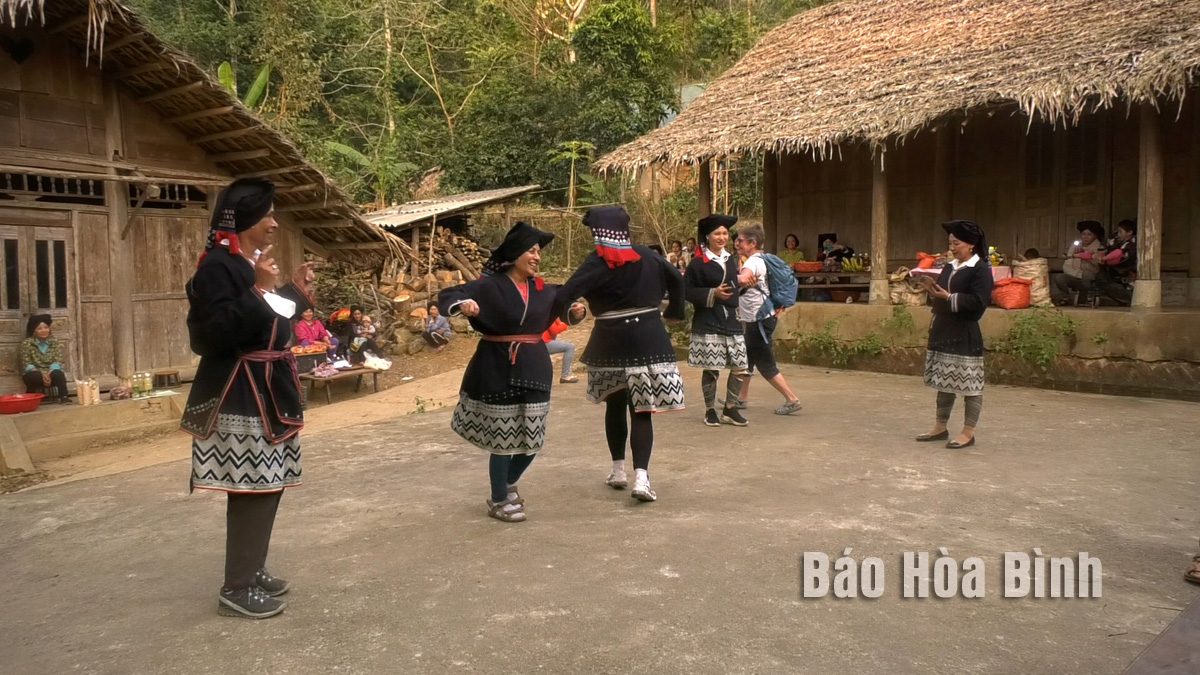
With a rich history of traditional culture, ethnic groups in Da Bac district, Hoa Binh province still retain their own cultural identity values such as dialect languages, traditional festivals, costumes, among others. These are favourable conditions for the locals to preserve, conserve and promote traditional cultural values while building attractive and diverse tourism products to attract tourists and bolster local socio-economic development.
Tourists in costumes of Dao ethnic people in Cao Son
commune, Da Bac district.
Sung hamlet, Cao Son commune is one of hamlets that keeps almost intact the
lifestyle, customs, and cultural identity of local Dao Tien ethnic group in Da
Bac. Dialect language, food and handicraft trades have been preserved and
maintained in their daily life.
Since tourism has been promoted in the locality, local Dao ethnic people have
selected some handicraft trades to develop them into tourism products such as
brocade weaving.
Residents in Sung hamlet have invested in building a spacious hamlet while
maintaining a clean landscape and environment over the years. Homestays are
well-invested, and more services have been introduced to meet the sightseeing
and relaxation demand of tourists.
In recent times, the hamlet has restored the craft of making Do paper, helping
tourists to learn and understand about the trade while contributing to
increasing incomes for local ethnic residents.
In addition, folk dances, such as bell, sword and lantern dances, and some
unique rites in ritual ceremonies or the use of khen (panpipe) music
instrument, among others have been added in art programmes to serve tourists.
Ban Kim Quy, Vice Chairman of the Da Bac District People's Committee, said
thanks to the promotion of traditional folk materials, art performances have
received warm response from tourists. Community-based tourism has been formed
and developed, attracting many tourists every year, contributing to poverty
reduction, and improving the locals' life.
In community-based tourism sites in the district, in addtion to promoting
traditional materials to develop tourism products, more attention has been paid
to the practice ofcultural heritage in the community toward sustainable
tourism development.
National cultural identity has become resources for community-based tourism
development. On the contrary, the more tourism develops, the more people are
encouraged to preserve their traditional cultural heritage, she added.
Located just a 20-minute drive from Hoa Binh City, Ora Hill Farmstay & Glamping Hoa Binh is a captivating new destination nestled in Mo hamlet, Bình Thanh commune, Cao Phong district. Combining farming with leisure, this tranquil retreat is perfect for those seeking balance, joy, and an immersive experience in the expansive beauty of nature.
Muong Bi - Tan Lac is renowned as one of the four famous Muong regions in Hoa Binh province. Blessed by nature with a favourable climate and stunning landscapes, Tan Lac holds great advantages for tourism development. The local tourism industry has made remarkable strides in recent times thanks to the attention and support from the local authorities and sectors.
With its strategic location, well-developed transport network, and diverse soil and climatic conditions, Hoa Binh is emerging as a must-visit destination in Vietnam's northwestern tourism corridor. The province boasts numerous attractions, including the Kim Boi hot springs (Kim Boi district), the Dau Rong cave complex (Cao Phong), the Mai Chau valley (Mai Chau), and the iconic Hoa Binh hydropower plant.
The northern mountainous province of Hoa Binh has been listed among the 71 most beautiful places to visit worldwide by the prestigious US travel magazine Condé Nast Traveller.
Hoa Binh province’s rich natural and cultural resources position it as a prime location for developing community-based tourism (CBT). In recent years, support from central and provincial policies, as well as assistance from non-governmental organisations, have encouraged local ethnic minority and mountainous communities to actively engage in the sector.



